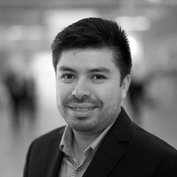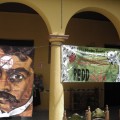The New Palestine
Andres Fuentes | December 6, 2012.
It was an early morning for Nedal Katbeh-Bade the day after Palestine became an observer state within the UN. As Minister’s Advisor for Climate Change for Palestine, he was called to an early meeting first thing with the UNFCCC legal council to explain the implications of the new status.
Katbeh-Bade had a smile on his face as he tells us the immediate effects for the Palestinian delegation at the UNFCCC. There was a new badge and a new seating arrangement, with Palestine moving ahead of South Sudan. Yet Palestine is not automatically a part of the UNFCCC. For Palestine to be admitted they would still need to apply for membership, requiring a written request from the President of Palestine within a period of 90 days.
The Verb sat down with a tired, but jovial, Katbeh-Bader for an interview on the implications of Palestine’s new status for their involvement in the UNFCCC and how climate change is affecting Palestine.
There are many benefits for Palestine if it was to join the UNFCCC, most important to Katbeh-Bader is being part of the international community. “There are a lot of benefits. First of all you will be part of the international community, you are then sharing then the responsibilities and benefiting from all the benefits of the conventions.”
He also highlighted the financial benefits: “We don’t have access to these multilateral funds because of our status.” There are more than 21 funding streams, including the Green Climate Fund, which is supposed to have a $100 billion per year by 2020. Currently, Palestine only has access to funding that comes from bilateral agreements.
Palestine too must consider the political ramifications of their membership. When they undertook a similar process to join UNESCO last year, the US cut its financial support to that body. This is one of the biggest considerations that Palestine is weighing before making a decision regarding their membership. Palestine is also exploring other options, like a draft decision to allow them to have access to the UNFCCC funds.
“A draft decision is with the chair of the G77 and China, and the whole group, we have 133 countries, they all agree.” On the timing of the draft decision he explained that, “we are awaiting the chance or the good time from the presidency of the convention, that yes, that this is a good time to submit the draft decision.”
When asked about the effects of climate change on Palestine, Katbeh-Bader spoke about the vulnerability of the area. “Palestine is part of the east Mediterranean, this part of the world, as said by the IPCC, is one of the areas of the world which will suffer more from the effects of climate change.”
One of the urgent manifestations of this is in a water shortage within the Palestinian Territory. Katbeh-Bader highlighted that they do not have enough water resources and that this has impacted their agriculture. “We got some information from the Ministry of Agriculture and for the last 20-25 years there are great decreases in the production output of these areas.”
Katbeh-Bader also discussed the work that Palestine is doing around the issue of climate change. Addressing whether Palestine would submit a voluntary pledge to the UNFCCC, he said, “I don’t think so, we have never been one of the causes of climate change in this world, we are sacrificing, we are severely affected by the impact of climate change.” He did, however, add that: “We have some plans for some kind of mitigation plans… we want to show the world that we are committed.” He also emphasised that while they are focused on adaptation they also hold mitigation to be important.
Palestine incorporates climate change into their education system at different stages. Katbeh-Bader told The Verb that “the first step to start is with the curriculum of the schools and universities, they will be leaders of the coming years, they will be the decision makers… they are the right people to start with.”
Katbeh-Bader believes that progress can be made at this conference, “Doha will be a very important milestone.”
“The Qatari government and the Qatari leadership for the last few years, they have their own fingerprints in the whole area, there are a lot of interventions from the Qataris… they were being able to drag Qatar from a very small country on the map to the top decision makers at the international level.”
“History will write that something happened in Doha.”
By Andrés Fuentes, photo by Laura Owsianka.











comment